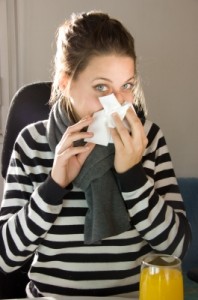It’s that time of the year – cold and flu season! 🙁 It’s a germ fest out there. Everywhere you turn, folks are sniffling, sneezing and coughing. And, the office is no exception. In one office, you may have 2 or 3 people out sick at the same time due to a traveling office bug, which leads me to the following question. Should you go to work sick? Of course, the answer to that question depends on several factors including company culture and sick leave benefits. I’ve worked in office environments where you were expected to come to work unless you were in the hospital fighting for your last breath. And, I’ve also worked for organizations with very generous sick leave benefits where you were expected to STAY HOME at the first sign of a cold or flu bug to avoid passing germs throughout the office.
So, should you go to work sick? If your illness is contagious and your organization offers generous sick time benefits, do yourself and your coworkers a favor by seriously considering your options before coming to work sick. If you can afford to take the day to get some rest, take it. You may actually find yourself recovering much faster. Rest gives your immune system the ammunition that it needs to knock that illness flat on its face. However, in this day and age, when companies are doing more with minimal resources, taking off may seem impossible. After all, if you’re not there, who’s going to get the job done? Or perhaps, you just don’t have the sick time to take off. Sometimes, it’s just not realistic to take the day off. In that case, talk with your employer to see if there is the possibility of working from home. Thanks to technology, many of the tasks that we perform in the office can also be performed right at home.
If working from home isn’t an option and you absolutely must come to work sick, be sure to take the following precautions to avoid sharing your germs with others:
1. Wash your hands often.
2. Use plenty of hand sanitizer, especially after sneezing and coughing.
3. Use a tissue when sneezing or coughing. If a tissue is not available, wash your hands after sneezing or coughing.
4. Avoid touching your eyes, nose or mouth. Your eyes, nose and mouth are full of germs that can be easily transferred to others. Use hand sanitizer or wash your hands if you do touch these areas.
5. Avoid shaking hands with people. I know that a firm handshake is the standard in business, but try your best to avoid making direct contact with others.
Whether you stay at home or have to go to work sick, using a few precautions to avoid sharing your germs will be greatly appreciated by your coworkers!







NO
[…] Should You Go To Work Sick? […]